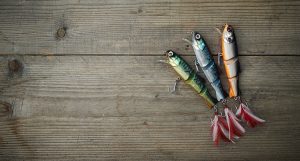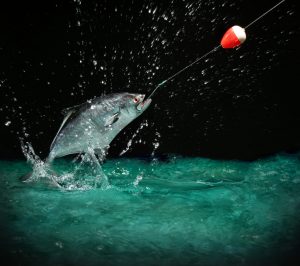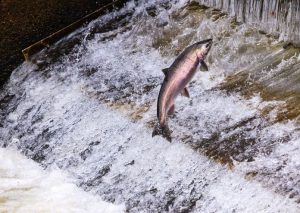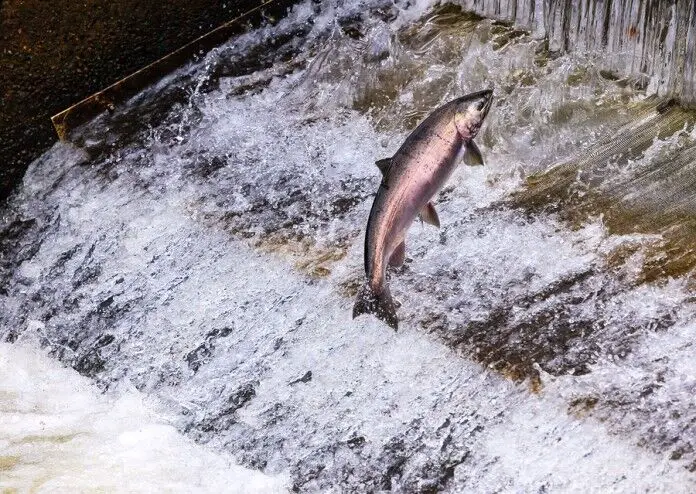
Ever found yourself in a survival scenario within the wilderness with little or no fishing gear at your disposal? Such a situation might be not only stressful but also dire. You’re bound to be hungry and frustrated. Luckily, one way of fending for yourself or your crew is by hitting the local waterway and hauling out some fish. By employing some survival techniques, you should be able to find some fish to eat.
The following are the top 5 fishing tips for survival:
Find Bait That’s Native to The Area
 You should find a rotting or old log and then turn it over. The chances are high that you’ll be presented with insects, worms, and grubs that fish love. You should also keep an eye on the shoreline. Most probably, you’ll discover minnows as well as other creatures swimming around. They make excellent bait.
You should find a rotting or old log and then turn it over. The chances are high that you’ll be presented with insects, worms, and grubs that fish love. You should also keep an eye on the shoreline. Most probably, you’ll discover minnows as well as other creatures swimming around. They make excellent bait.
Where you see minnows, grab a stick, and whack the water. By doing that, you’re most likely to kill or stun a few which you can utilize for bait. Since your actions will create noise, ensure you collect as much as you can. Before fishing, you should wait for some time.
The Best Time to Fish Is at Night
 Plenty of fish, especially the bottom feeders, normally feed at night. Consequently, find a great chunk of bait, perhaps some smaller fish that you caught earlier and then keep the line out through the night. It’ll surprise you the amount of fish you’ll catch. As you leave your fish gear unattended, ensure you tie the line tightly to something. Even a tiny 1 – 2 lb fish can be able to pull your fishing gear into the water.
Plenty of fish, especially the bottom feeders, normally feed at night. Consequently, find a great chunk of bait, perhaps some smaller fish that you caught earlier and then keep the line out through the night. It’ll surprise you the amount of fish you’ll catch. As you leave your fish gear unattended, ensure you tie the line tightly to something. Even a tiny 1 – 2 lb fish can be able to pull your fishing gear into the water.
Fish On Flowing Water
 An effective fishing tip many people don’t know is that fishing on flowing water is better compared to stagnant water. However, if you’re fishing in a pond or lake, it doesn’t apply. The tip applies to tidal areas and rivers where you should find some little water flow but not a raging current.
An effective fishing tip many people don’t know is that fishing on flowing water is better compared to stagnant water. However, if you’re fishing in a pond or lake, it doesn’t apply. The tip applies to tidal areas and rivers where you should find some little water flow but not a raging current.
Some little flow is great because it’s effective at attracting fish. Feeding fish tends to hang out behind logs or rocks so that they don’t fight the current. When your bait fish swims by, the fish can then ambush it. Therefore, the best places to fish are docks, logs, rocks, etc.
Consider Natural Poisons
 While you shouldn’t practice poisoning outside survival scenarios, there’s no harm in utilizing natural poisons in shallow water pools. So what is meant by ‘natural’ poisons? Here are some things that are readily available to poison fish but are harmless to humans:
While you shouldn’t practice poisoning outside survival scenarios, there’s no harm in utilizing natural poisons in shallow water pools. So what is meant by ‘natural’ poisons? Here are some things that are readily available to poison fish but are harmless to humans:
- Lime – You can make it by burning and crushing seashells. They’re great at poisoning fish in the shallow pools.
- When used in large adequate quantities, young nut husks from walnuts are effective at poisoning fish.
- Plenty of plants can accomplish this goal. However, you’ll have to do extensive research before heading out.
By using this strategy, you’ll be able to gather a substantial fish amount.
Hand Fishing And Grill Net
Hand fishing is as primitive as your fishing can get. In this kind of fishing, you can use your bear hands to pull fish from its watery lair. Based on your geography, various names are used to describe this activity. Some of the names include:
- Stumping
- Fishing tickling
- Grabbling
- Gurgling
- Catch fisting
- Hogging
- Graveling
- Noodling
All you need to do is put on gloves and step into the murky waters to grab some catfish.
When it comes to gill net, you can utilize the nets to grab fish as they swim through your net’s opening. As they do that, the fish will end up getting entangled. Gill nets are highly effective at different times in different places. Nonetheless, they yield incredible results when fish are on their migratory run.
Tips to cook fish for survival
After looking at some fishing tips for survival, it’s paramount to know how to not only prepare but also cook and store your fish in a survival situation. Improper cooking fish, cleaning or storing it can result in your fish becoming inedible.
You should never consume fish that appears spoilt. It’s important to note that cooking doesn’t transform spoiled fish into edible one. The following are some signs of spoilage:
- Peppery or sharp taste
- Peculiar odor
- Sunken eyes
- Suspicious color
- Slimy rather than wet or moist body
You should also use the right equipment to prepare and cook your fish. Since fish spoils very fast, after catching, you should prepare and cook immediately. Because in the wild you don’t have tools such as the top electric fillet knives, a pocket knife would be handy to cut out the large blood vessels and gills. While you can cook it over an open fire, the best way to do it is to boil. Doing so will ensure you obtain the most food value.
Conclusion
So tragedy has come your way. You’re on the run and have run out of something to eat … As you ponder about depleting your food supply, you just recall you have an emergency fishing kit. If you find yourself in such a situation, the above are the fishing tips you should employ to help you grab some fish.
We are FOOD Adviser. We always give you in-depth reviews and helpful advice about preserving your food. Our mission is to help you choose the best products with the most affordable prices that match your needs.

